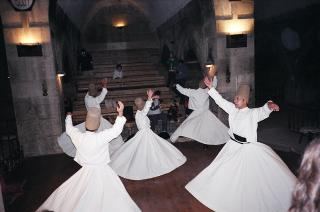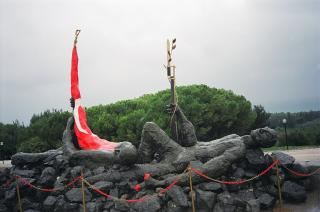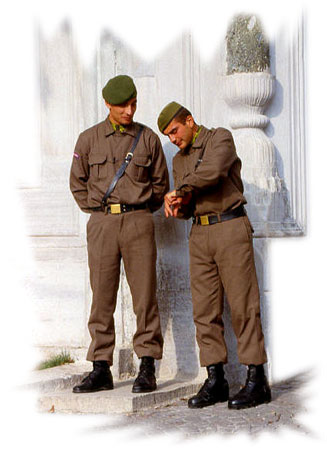Turkey is a singular country in many ways. It is the only Moslem country that has one foot in Europe and one in Asia. It is the only Moslem country that is a full member of NATO, with the second largest army after the United States. It is the only Moslem country that is a good ally of Israel. It is the only Moslem country whose citizens have undergone periodic coups d'etat in order to preserve Kemalism or fierce secularism - its official creed.
 It is also singular in even less praiseworthy ways: it was responsible for the direct or indirect death of 1.5 million Armenians in 1915-1916 and to date, refuses to admit any wrongdoing, although that might be changing soon. The government had finally allowed the screening of Canadian film Ararat, which chronicles the genocide that inspired Hitler to do it bigger and better, when the decision was reversed indefinitely because of threats from extremists. The censors had imposed a few minor cuts: no rape scenes of Armenian women by Turkish soldiers, please. Armenians were either shot outright or marched out into the desert where they died of thirst, starvation or sunstroke or were dumped directly into the Black Sea. The Ottoman authorities claimed that there was a revolt in Van, a city with a high density of Armenians, or that Armenian men turned their coats and enlisted in the Russian army or that they wanted to overthrow the Ottoman government. Armenian historians have set the record straight: the Armenians only defended their city after it was attacked and they owed no allegiance to Turkey anyway since by 1914 the Russians had acquired sovereignty over more than half of the Armenian population. Regardless of the historical perspective that convinces you, Ararat is a movie worth seeing, thanks to the passionate contributions of talented Armenians like Charles Aznavour and Atom Egoyan.
It is also singular in even less praiseworthy ways: it was responsible for the direct or indirect death of 1.5 million Armenians in 1915-1916 and to date, refuses to admit any wrongdoing, although that might be changing soon. The government had finally allowed the screening of Canadian film Ararat, which chronicles the genocide that inspired Hitler to do it bigger and better, when the decision was reversed indefinitely because of threats from extremists. The censors had imposed a few minor cuts: no rape scenes of Armenian women by Turkish soldiers, please. Armenians were either shot outright or marched out into the desert where they died of thirst, starvation or sunstroke or were dumped directly into the Black Sea. The Ottoman authorities claimed that there was a revolt in Van, a city with a high density of Armenians, or that Armenian men turned their coats and enlisted in the Russian army or that they wanted to overthrow the Ottoman government. Armenian historians have set the record straight: the Armenians only defended their city after it was attacked and they owed no allegiance to Turkey anyway since by 1914 the Russians had acquired sovereignty over more than half of the Armenian population. Regardless of the historical perspective that convinces you, Ararat is a movie worth seeing, thanks to the passionate contributions of talented Armenians like Charles Aznavour and Atom Egoyan.
How could the Ottomans have behaved in such an ignoble way when in 1492 they nobly provided asylum to the Jews who fled from the Spanish Inquisition? And their predecessors, after all, had sheltered Christians in underground cities long before Rome saw Jesus and became the seat of Christendom. This can be explained by historical amnesia or the "but this is different" syndrome. Today Turkey is a Secular Democratic State thanks to Kemal "Atatürk", the Father of the Nation, who established a European-style republic after the collapse of the Ottoman Empire following World War I. However, the state has been repressing the cultural and linguistic rights of the Kurdish minority -estimated at more than 20% of the population- to such an extent that many have been forced into exile or armed rebellion. Is this a continuation of amnesia or a case of dyslexia? Perhaps all this confusion about national identity is because Kurd is almost an anagram of Turk.
How Turks feel about their faith and national identity affects the green belt
theory of the United States. The U.S. has been known to bolster Islamic regimes
to contain communism. However, with the fall of the iron curtain and political
changes in Turkic speaking states, the name of the game has changed, albeit
not the game itself.  The
iron curtain of political Islam is now seen as a major threat. The U.S. wishes
to stop this perceived Islamic onslaught against a way of life attached to
an oil and blood drip. Turkey is a signatory to the Baku-Tbilisi-Ceyhan agreement
to bring oil from the Caspian Sea to the Mediterranean. There have been vociferous
protests by environmentalist and pacifist groups, including some Kurdish communities
who would lose their land and livelihood. And didn't Shevardnadze in Georgia
recently get into deep trouble for sending oil to the Russians instead of
pumping it into the Mediterranean? Or was it the other way around?
The
iron curtain of political Islam is now seen as a major threat. The U.S. wishes
to stop this perceived Islamic onslaught against a way of life attached to
an oil and blood drip. Turkey is a signatory to the Baku-Tbilisi-Ceyhan agreement
to bring oil from the Caspian Sea to the Mediterranean. There have been vociferous
protests by environmentalist and pacifist groups, including some Kurdish communities
who would lose their land and livelihood. And didn't Shevardnadze in Georgia
recently get into deep trouble for sending oil to the Russians instead of
pumping it into the Mediterranean? Or was it the other way around?
Turkey is arguably one of the most interesting countries in the world in terms of its history, its geography and the many cultural influences that have shaped its character. The caravans that sought food and shelter in the karavanserais and traded in the hans that dotted the landscape were great cross-pollinators of goods, services and ideas. Some of these 13th Century hostelries and storage depots, built by the Seljuk and Ottoman Turks to protect travellers crossing Anatolia along the Roman-Byzantine system, are still standing strong. The cesmes, or water tanks attached to mosques in observance of the Koranic principle that providing free water -the source of life- is a civic duty, were other early forms of government-provided social services. Unfortunately the Free Trade Agreement in North America is hell-bent on reneging on this time-honoured social contract.
Turkey is not only surrounded by several seas, but as the biological watershed of two continents, it sustains diverse vegetation such as Jerusalem sage and tulips. Tulips, revered by the Ottomans for their loveliness and holiness -their Turkish name lale is close to Allah- travelled to Western Europe in the 16h Century and stayed there. Dutch horticulture and Ottawa's parks greatly benefited from this migration.
Turkish contribution to modern civilization is not limited to tulips. The Tigris and Euphrates basin, the putative site of the Garden of Eden, has given birth to several major civilizations, such as Anatolia - "Motherland" - and Asia Minor. The Hittites, the Persians, the Lydians, the Greeks, the Romans, the Byzantines, the Ottomans and many more have all claimed this land. Catalhoyuk, near Konya - the resting place of Celaleddin Rumi, mystic poet and founder of the Dervish sect - is considered one of the first urban settlements in the world. Turkey is also the site of Mount Ararat, the biblical resting place of Noah's Ark and the spiritual home of the Armenian Diaspora. Ephesus is the final resting place of Meryemana or Mother Mary, that is, unless you accept the tradition that says her resting place is Jerusalem. That Paul the Apostle was born in what is now modern Turkey is a less disputed fact. And it is in Gordium, 60 miles west of Ankara, that Alexander the Great untied the Gordian knot in one fell swoop of his powerful sword thereby fulfilling the prophecy that whoever achieved this feat would rule over Asia one day.
Located at the crossroads of the silk route from China all the way to Europe, Turkey straddles three continental plates, the Anatolian, the Eurasian and the Arabian tectonic plates, with their consequent earthquakes. Earthquakes have historically wreaked havoc in the country, but in 1999 the two major earthquakes that hit Greece and Turkey a few months apart led to a touching show of mutual solidarity and a rapprochement between these traditional enemies. Deep down, the people, not the rulers, know that Turkish coffee and Greek coffee taste the same.

Earthquakes have destroyed many lives in Turkey, but the battle of Gallipoli in 1915 caused the death of 250,000 Turks and a similar figure on the Allied and Anzac side. This battle is a good example of how war is ultimately a zero-sum equation.
Aside from the political and tectonic tensions that beset this nation, there is the ongoing war of the headscarves currently raging in government and media circles. There are feminists and traditionalists on both ideological camps. Some people, both men and women, consider that covering one's head is an affirmation of religious freedom. The government sees headscarves as an in-your-face kind of statement by political Islamists. Others couldn't care one way or another, but many women are worried, because Iran is too close for comfort. The Koran is clear on the matter: women should cover their beauty. Now, does beauty mean their secondary sexual characteristics or the hair, shoulder and arms? This debate has stopped some traditional women from graduating from medical school or holding government jobs, but it did not stop Tansu Ciller, a Europeanized woman, from becoming the first female prime minister of the country in 1993. This was certainly a milestone in women's rights, but a flop in political terms. Ciller’s alliance with the Americans as well as traditional Islamists made many people uneasy. Feminism was clearer in Atatürk's time. Sabiha Gökcen, born in 1913 and adopted by Atatürk in 1925, became Turkey's first female pilot and the first female combat pilot in the world. Istanbul Airport proudly bears her name.

A visitor arriving in Istanbul is immediately struck by the beauty of the city, the affability of the people, the melody of the language and the insistent call of the muezzin to prayer, giving one the sensation of stepping into a fairy tale. However, the heavy presence of military uniforms quickly dispels this notion. One feels safe and protected if one follows the rules - and there are many- and vaguely threatened if one strays from the beaten path. Turkey is both timeless and modern, prosperous and spartan, appeasing and disquieting. The national slogan, first voiced by Atatürk , is: Ne Mutlu Turkum Diyene - Happy is the person who can say he is a Turk. Whether Turks will continue to be happy with their lot or not greatly depends on whether the seismic fault that rumbles under the ground will split the country asunder. On the other hand, the watershed that draws a line between East and West, Islam and Christendom, tradition and modernity might just turn out to be the seam that binds these two centrifugal forces and the rest of the world together.
While history sorts this out, let us heed Mevlana Celaleddin Rumi's wise and welcoming words:
"Come, come whoever you are,
Infidel, pagan or fire worshipper,
Come to me,
Our convent is not a place of despair.
Even if you have broken
Your vow a hundred times
Come to us again, come."
Turkey beckons.